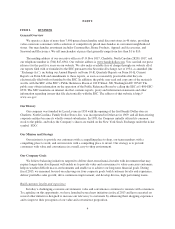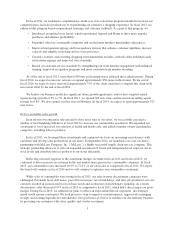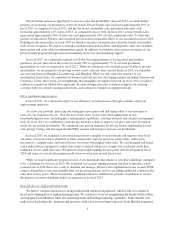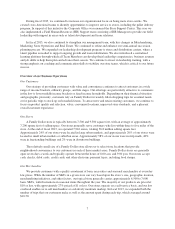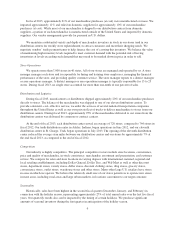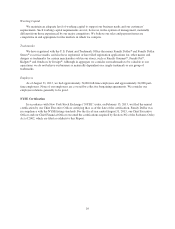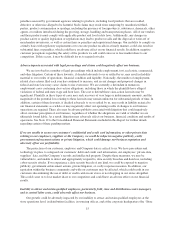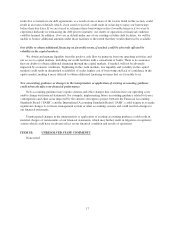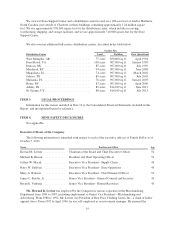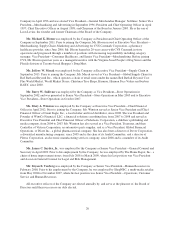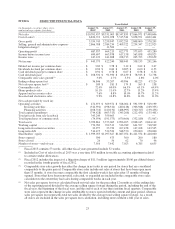Family Dollar 2013 Annual Report Download - page 18
Download and view the complete annual report
Please find page 18 of the 2013 Family Dollar annual report below. You can navigate through the pages in the report by either clicking on the pages listed below, or by using the keyword search tool below to find specific information within the annual report.state wage requirements, employee rights, health care, and social welfare or entitlement programs, such as health
insurance, paid leave programs, or other changes in workplace regulation or tax laws, could adversely impact our
ability to achieve our financial targets. Changes in other regulatory areas, such as consumer credit, privacy and
information security, product safety, supply chain transparency or environmental could cause our expenses to
increase. In 2010, Congress enacted comprehensive health care reform legislation which, among other things,
includes guaranteed coverage requirements, eliminates pre-existing condition exclusions and annual and lifetime
maximum limits, restricts the extent to which policies can be rescinded, and imposes new and significant taxes
on health insurers and health care benefits. Due to the breadth and complexity of the health care reform
legislation, the current lack of implementation regulations and interpretive guidance, and the phased-in nature of
the implementation, it is difficult to predict the overall impact of the health care reform legislation on our
business over the coming years. Adverse effects of the health care reform legislation include increased costs,
exposure to expanded liability and new requirements for us to revise ways in which we conduct business.
Our business is subject to federal, state, local and international laws, rules and regulations, such as wage and
hour laws, anti-corruption laws, import and export laws, unclaimed property laws and many others. The
complexity of the regulatory environment in which we operate and the related cost of compliance are both
increasing due to legal and regulatory requirements, increased enforcement and our ongoing expansion of our
Global Sourcing operations. In addition, as a result of operating in multiple countries, we must comply with
multiple foreign laws and regulations that may differ substantially from country to country and may conflict with
corresponding U.S. laws and regulations. We may also be subject to investigations or audits by governmental
authorities and regulatory agencies, which can occur in the ordinary course of business or which can result from
increased scrutiny from a particular agency towards an industry, country or practice. If we fail to comply with
laws, rules and regulations or the manner in which they are interpreted or applied, we may be subject to
government enforcement action, class action litigation or other litigation, damage to our reputation, civil and
criminal liability, damages, fines and penalties, and increased cost of regulatory compliance, any of which could
adversely affect our results of operations and financial performance.
We rely on suppliers, third-party distributors and carriers whose operations are outside our control; any
failure by them to deliver products in a timely manner may damage our reputation and could cause us to lose
customers.
We rely on arrangements with third-party distributors and carriers, such as independent shipping companies,
for timely delivery of products to stores and distribution centers throughout the country. As a result of our
reliance on third-party distributors and carriers, we are subject to carrier disruptions and increased costs due to
factors beyond our control, including labor strikes, inclement weather, trade restrictions, and increased fuel costs.
During fiscal 2013, we launched an exclusive six-year agreement with McLane, a large supply chain services
company that serves as a principal distributor for a portion of our merchandise, including tobacco products and
most refrigerated and frozen items. If the services of any of these third-parties become unsatisfactory, we may
experience delays in meeting our customers’ product demands and we may not be able to find a suitable
replacement on a timely basis or on commercially reasonable terms. Any failure to deliver products in a timely
manner may damage our reputation and could cause us to lose customers.
Our largest supplier accounted for almost 9% of our merchandise purchases, and we distributed approximately
13% of our merchandise through our relationship with McLane. We have not experienced difficulty in obtaining
sufficient quantities of core merchandise and believe, if one or more of our current sources of supply became
unavailable, we would generally be able to obtain alternative sources without experiencing a substantial disruption
of our business. However, such alternative sources could increase our merchandise costs and reduce the quality of
our merchandise, and an inability to obtain alternative sources could adversely affect our sales.
Product and food safety concerns and the effects of legislation and regulations on product and food safety and
quality could adversely affect our sales and results of operations.
Federal or state legislation and regulations regarding product and food quality and safety may negatively
impact our operations. We may be subject to product liability claims from customers or actions required or
14


